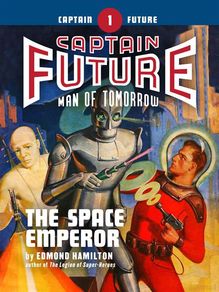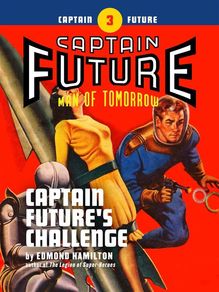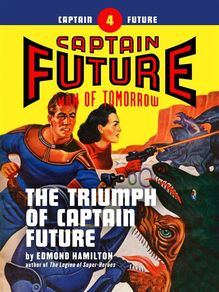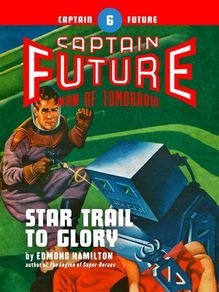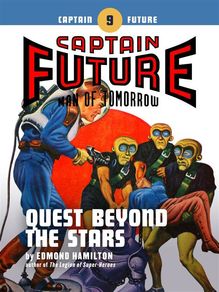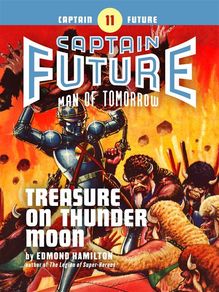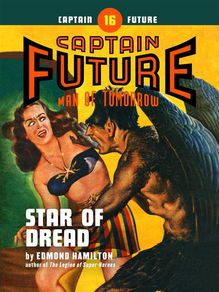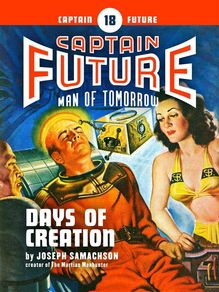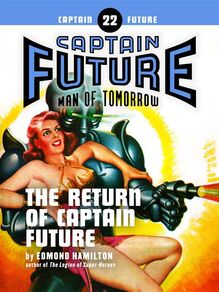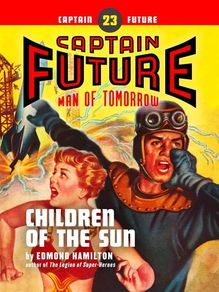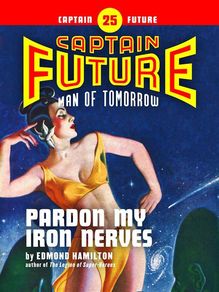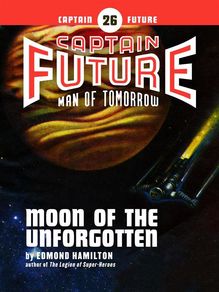-
 Univers
Univers
-
 Ebooks
Ebooks
-
 Livres audio
Livres audio
-
 Presse
Presse
-
 Podcasts
Podcasts
-
 BD
BD
-
 Documents
Documents
-
- Cours
- Révisions
- Ressources pédagogiques
- Sciences de l’éducation
- Manuels scolaires
- Langues
- Travaux de classe
- Annales de BEP
- Etudes supérieures
- Maternelle et primaire
- Fiches de lecture
- Orientation scolaire
- Méthodologie
- Corrigés de devoir
- Annales d’examens et concours
- Annales du bac
- Annales du brevet
- Rapports de stage
La lecture à portée de main
Découvre YouScribe en t'inscrivant gratuitement
Je m'inscrisDécouvre YouScribe en t'inscrivant gratuitement
Je m'inscrisEn savoir plus
En savoir plus

Description
The Captain Future saga follows the super-science pulp hero Curt Newton, along with his companions, The Futuremen: Grag the giant robot, Otho the android, and Simon Wright the living brain in a box. Together, they travel the solar system in series of classic pulp adventures, many of which written by the author of The Legion of Super-Heroes, Edmond Hamilton.
Sujets
Informations
| Publié par | Thrilling |
| Date de parution | 30 juillet 2018 |
| Nombre de lectures | 60 |
| EAN13 | 9788828366010 |
| Langue | English |
Informations légales : prix de location à la page 0,0007€. Cette information est donnée uniquement à titre indicatif conformément à la législation en vigueur.
Extrait
Captain Future's Challenge
Captain Future book #3
by
Edmond Hamilton
Striking Terror on Four Worlds, a Mysterious Raider Throttles Interplanetary Commerce—and Earth Summons Curtis Newton, the Wizard of Science, and His Trio of Futuremen to Combat this Sinister Menace….
Thrilling
Copyright Information
“Captain Future's Challenge” was originally published in 1940. No part of this book may be reproduced or utilized in any form or by any means, electronic or mechanical, without permission in writing from the publisher.
Chapter I
Zero Hour
THE man who sat before a powerful televisor transmitter in the dim, cubbylike room might have been an Earthman. Or he might have been a Martian, or a Jovian, or any other planetary native. It was impossible to tell which.
For his whole body was concealed by a black space-suit. Even the glassite helmet of his suit had been painted black, except for the eyeholes. The man inside it could see, but he could not be seen.
He reached toward the towering panel of the big televisor and tuned to a secret wavelength. Generators built up to a snarling, angry whine. Then he spoke into the microphone below the visi-screen. “The Wrecker calling Ship One!” he hissed.
On the visi-screen appeared the interior of a small spaceship. Then appeared the face of the spaceship’s commander, a white-skinned, dark-haired young Venusian. His eyes stared strangely at the screen, hollow-eyed, and there was a stiff, awkward jerkiness to his speech as he spoke.
“Ship One reporting, sir.”
“You are at the designated position?” demanded the hissing voice of the man who called himself the Wrecker.
“Yes, sir, we are lying off Mercury now.”
“Good—you will strike at exactly ten o’clock, solar time.”
The Wrecker pushed another button. “Ship Two!”
The interior of another spaceship flashed into the screen. Its commander was a lanky, gray-skinned Neptunian, but he had the same hollowness of eye and uncanny stiffness of speech as the Venusian.
“Ship Two reporting, sir,” the Saturnian said. “We are progressing toward Mars on schedule.”
“Strike at exactly ten, solar time,” ordered the Wrecker’s sibilant voice.
Another button was pressed. “Ship Three!”
A hulking Earthman, as oddly strange in appearance as the other two ship-commanders, reported from the third ship. “Ship Three off Saturn, sir. We are ready to descend and blast the stockade at any moment.”
“Blast at ten, solar time,” the Wrecker ordered.
Then the black-veiled figure of mystery touched the switch that called across the Solar System to a fourth spaceship.
A big green Jovian, his large, circular dark eyes hollowly solemn, answered in thick, jerky accents from the fourth craft. “Ship Four, sir. We are approaching Earth’s Moon.”
The Wrecker’s dark figure tensed.
“Your mission is the most perilous of all,” he told the Jovian. “Remember, if you make one slip, you’ll fail to get this man. He must be captured or he’ll ruin our whole plan. Ten o’clock solar time is the zero hour,” rasped the Wrecker. “Attack at exactly that time.”
The Wrecker touched a larger switch. The visi-screen went dark, and the snarling whine of generators sank and died. The dark-veiled figure of mystery hunched, brooding.
“The plan can’t fail, now,” he told himself. “The one man who might spoil it will be in our power. The System, reeling under this blow, will call to him for help as usual. But he won’t answer this time. Nobody will answer.”
The Wrecker’s dark form stiffened.
“Gravium! The key to the whole Systems’ life—and that key will soon be in my hands! Only forty minutes to zero hour—”
ZERO hour….
The Hot Side of the planet Mercury sizzled under the scorching heat of the sun that seemed to fill half the brassy sky. That flaming orb, only thirty-six million miles away, kept this side of the planet at a temperature above the melting point of most metals!
Yet there were men at one spot in this hottest place in the nine worlds. Upon the seared, blackened rock-plain of the Hot Side stood the clustered smelters, barracks, offices and open rock workings of one of the System’s five gravium mine-companies.
This mine was protected from the fearful heat that otherwise would instantly slay all here. From a towering radiator-mechanism arched a domelike “halo” of blue force, a screen of vibrations that barred terrific solar radiance.
A young Mercurian metallurgist came out of the laboratories and glanced up at the colossal orb flaming overhead. He speculated, for the thousandth time, what would happen if the “halo” failed and the solar heat penetrated.
“Thank the gods of space the ‘halo’ radiator is failure-proof,” he told himself. “Otherwise there’d be no mine here. Even as it is, gravium is the only thing that would draw men to this place.”
Gravium! The most precious and important metal in the Solar System! For upon gravium depended all the interplanetary trade and traffic of the nine worlds. Without gravium there would be no gravitation equalizers, no interplanetary flight.
The young Mercurian glanced at his watch. “Ten o’clock, sun time! I’d better be getting back to work—” He stiffened suddenly.
A black space-cruiser was diving down out of the brassy sky. It roared over the “halo”—shrouded mine, and a small black object dropped from the cruiser toward the “halo” radiator.
Next moment, with a roar and flash of white fire, the big radiator mechanism flew to fragments.
“An atomic bomb!” yelled the Mercurian. “This means death for—”
Even as he realized the imminence of death, he died. The fearful solar heat, striking the little mine-settlement as its screen of protective vibrations was destroyed, reduced that young Mercurian’s body to a charred black cinder instantaneously.
Within ten minutes, every trace of the Mercury gravium mines and its workers had been completely destroyed by the terrific solar heat.
IT WAS night in the equatorial desert of Mars. The stars shone brilliantly in the chill, clear air, and the two meteorlike moons cometing across the heavens shed a pale radiance. That light illuminated the busy mine of the Mars Gravium Company. For here on Mars, too, was mined a small quantity of the precious gravium that made interplanetary travel possible.
Two Martian laborers came out of a tunnel for a breath of air. Red-skinned men with bold heads and big-chested figures, they breathed in the chill night air gratefully. It lacked two minutes of ten o’clock, solar time—
“What’s that up there, Arraj?” the younger Martian asked, pointing up.
The older man looked. Up there against the superbly blazing Milky Way, a tiny black spot was growing.
“Looks like a meteor coming this way,” he said quickly. “But it must be a big one—”
“Look, Arraj—it is a meteor!” cried the younger Martian excitedly. “And there’s a ship guiding it!”
The two stared for a moment at the incredible spectacle. That expanding black spot was clearly a giant meteor, rushing now at tremendous speed toward Mars. And close beside the booming meteor rushed a dark spaceship, playing rays upon the great mass. The ship was propelling the meteor toward Mars—
“That meteor’s going to strike here!” yelled the young Martian wildly. “That ship’s deliberately guiding it to hit the mines here—”
The great meteor was rushing straight down toward them, looming larger and larger. The ship that had guided it until the last moment was now rocketing back out to space.
The younger of the two Martians tried to scream an alarm as the monstrous mass darted down. He could utter no sound; paralysis gripped him.
Then the giant meteor struck. The concussion shook the lonely Martian desert for leagues. And when the quaking shudder of the planet ceased, the gravium mines had—disappeared. The impact of the great meteor had made that whole region a fusing, superheated wreck of shattered rock.
DAWN was breaking over the southern part of Saturn. Low on the northern horizon, over the great plains which cover most of this giant, prairie-world, the stupendous arc of the Rings glittered less brightly against the star-studded sky.
Down low in one of the southern valleys of Saturn, the rising Sun gleamed off the white cement buildings and raw rock pits of the gravium workings. For here, too, was mined some of the precious gravium vital to the System. Around the whole gravium mine towered a stockade of atomic flame. Atomic projectors set close together formed a ring whose unceasing jets of flame alone kept out the gray, creeping monsters that could be glimpsed outside.
Those gray, great crawling things were the dreaded Silicae—strange beings composed of inorganic compounds with a siliceous base. Like all siliceous life, they ate metal, and would attack any place to satisfy their avid craving. The exposed veins of gravium in the workings, the metal of the machines here, were a constant lure to the Silicae. Always, they hungrily circled the stockade of flame.
The tall, blue-skinned Saturnian engineer who came out of his cabin, rubbing sleep from his eyes, stared distastefully at the crawling gray monsters visible outside the flame-fence.
“Damned vermin,” he muttered disgustedly. “I’m tired looking at them. What I need are some bright lights and pretty girls.”
It was ten o’clock Solar Time. The engineer started toward the barracks to rouse his men for the day-shift. Suddenly he stopped and peered upward.
“What the devil—”
A black spaceship was diving toward the gravium mines. From it darted a powerful atom-beam that struck and demolished the atomic projectors of a whole sector of the stockade. That whole part of the flame-fence died. The ship darted up
-
 Univers
Univers
-
 Ebooks
Ebooks
-
 Livres audio
Livres audio
-
 Presse
Presse
-
 Podcasts
Podcasts
-
 BD
BD
-
 Documents
Documents
-
Jeunesse
-
Littérature
-
Ressources professionnelles
-
Santé et bien-être
-
Savoirs
-
Education
-
Loisirs et hobbies
-
Art, musique et cinéma
-
Actualité et débat de société
-
Jeunesse
-
Littérature
-
Ressources professionnelles
-
Santé et bien-être
-
Savoirs
-
Education
-
Loisirs et hobbies
-
Art, musique et cinéma
-
Actualité et débat de société
-
Actualités
-
Lifestyle
-
Presse jeunesse
-
Presse professionnelle
-
Pratique
-
Presse sportive
-
Presse internationale
-
Culture & Médias
-
Action et Aventures
-
Science-fiction et Fantasy
-
Société
-
Jeunesse
-
Littérature
-
Ressources professionnelles
-
Santé et bien-être
-
Savoirs
-
Education
-
Loisirs et hobbies
-
Art, musique et cinéma
-
Actualité et débat de société
- Cours
- Révisions
- Ressources pédagogiques
- Sciences de l’éducation
- Manuels scolaires
- Langues
- Travaux de classe
- Annales de BEP
- Etudes supérieures
- Maternelle et primaire
- Fiches de lecture
- Orientation scolaire
- Méthodologie
- Corrigés de devoir
- Annales d’examens et concours
- Annales du bac
- Annales du brevet
- Rapports de stage
